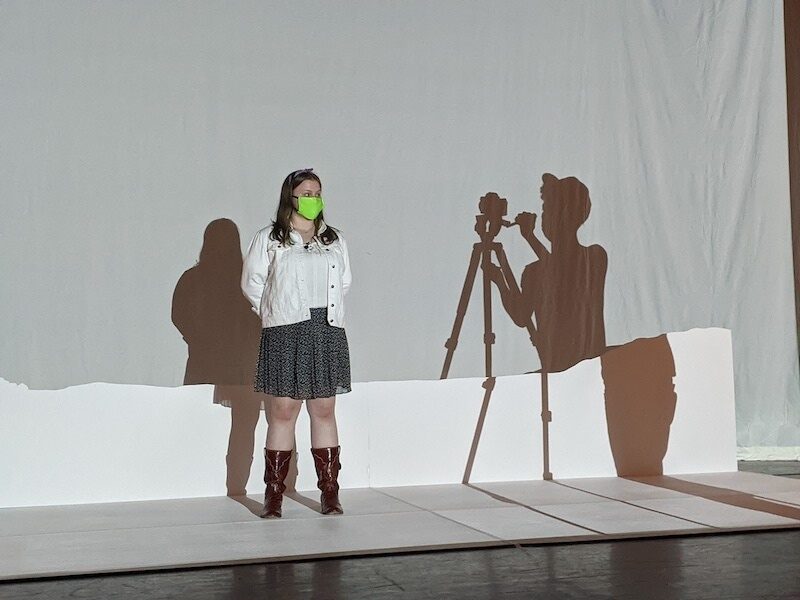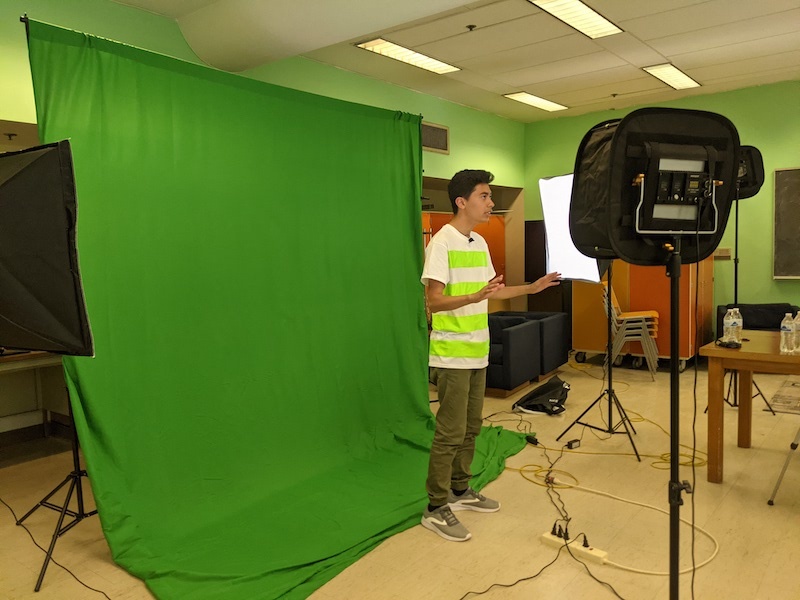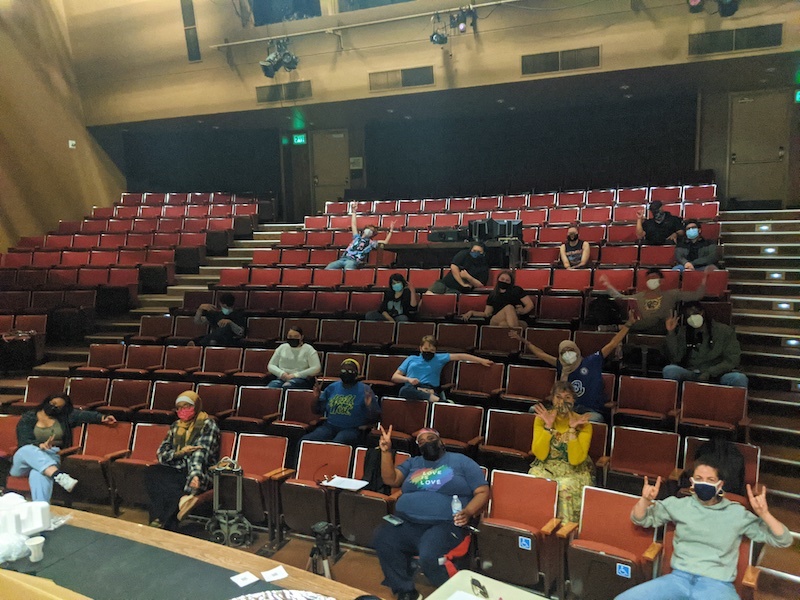Let Yourself Listen in on Someone’s Innermost Soul at Long Last With STARFISH Project’s 2020 Vision: Through Our Eyes
Review of 2020 Vision: Through Our Eyes, presented by STARFISH Project
Written by Teen Writer Rosemary Sissel and edited by Teen Editor Lucia McLaren

A face, speaking directly to the video camera. Alone. It’s almost overwhelmingly intimate. To stare into someone’s eyes—eight people’s eyes—as they share their pandemic stories. Their insecurities, anxieties, quiet hopes, and innermost dreams. It’s terrifying—and everything we need. STARFISH Project’s 2020 Vision: Through Our Eyes allows us the long-lost luxury (and necessity) of hearing others open up their souls.
The hour-long recording begins with one person, alone in a Zoom call. More people join, but no one speaks. The scene cuts to a poet, writing alone, dramatically lit so that her writer’s block broadcasts against a backdrop of utter darkness. She grabs a piece of paper inscribed with the words “I can do this,” crumples it up, and throws it away.
The lighting and angle of the shot and the way that the camera circles her all make me feel as if I’m trespassing, looking in on a moment that wasn’t necessarily meant to be shared. This theme continues throughout.
Sometimes I look over someone’s shoulder, watching them scroll through social media, implicitly allowed to peer into this private part of their life. One person tells her story to her computer, perhaps to a friend over a Zoom call, while I peer from overhead in a birds-eye camera angle, surveying the situation like some kind of bird spy. Another time, someone’s TikTok feed is reflected in their glasses as I squint my eyes, watching them watch someone else.
Throughout the show, I am invited more and more deeply into these individual’s lives. And not everyone uses the art form to make me feel like an intruder. Some meet me head-on, directly addressing the fact that they are choosing to share their story through a recording.
One individual is painfully aware of the camera, spending a good three and a half tantalizing minutes trying to decide which deep, private parts of herself (and her fandomverse) she would be okay with revealing before eventually face planting into her bed. Another artist records her feelings over audio and it plays in the background while video footage of her stares silently out at me, chin resting on her hand, barely blinking. Yet another person chooses to be videotaped from a variety of shots of the food she leaves untouched next to her, no face or any upper half of her body included.
The Zoom call from the beginning of the film returns again, in another form, as each of the performers lives their own life within the constraints of their own square. Individuals read, play ukulele, pet cats, or even wash hands, all together in one virtual space and yet never even slightly acknowledging each other’s existence. It’s painfully lonely. And there’s no one else I would trust more to share such pain.

The STARFISH Project is an arts education arm of Intiman Theatre that provides free after-school theater training for Seattle high school students. Intiman is really, really cool, and does a lot of important work using “the power of story and education to activate dialogue, confront inequity, and build collective joy” (see the best mission statement on the planet)—but STARFISH is, if possible, even better.
Every year since its founding, STARFISH has placed diverse youth voices front and center. Their productions are about youth, told exclusively by youth, and are completely imagined, designed, planned, and brought to life by youth. That was a lot of repetition of the word “youth.” The point being: we kiddos are glorious.
We have this startlingly honest and radically society-shifting way of looking at the world as it is. We see our universe with all of its flaws and beauty and injustices, right in this moment. Because we have been on this earth for a relatively shorter amount of time, we are so present! Every moment is earth-shatteringly new.
Even though I write for a youth blog about art and what we kids think of it, it’s not very often that I get the honor of reviewing work that my peers have birthed into the Seattle art scene. I just want to take a moment to savor the high-school-age power of this piece. Brought into the world by a group of passionate youth (and, I’m sure, awesome and slightly older mentors), 2020 Vision is unflinchingly open, deeply authentic, and emotionally raw.
Everything is set to an originally composed soundtrack (also youth-made) that swims from jazzy and elegant to melancholy and listless. Each scene centers around one person sharing bits of their stories as poetry or an anecdote or a heart-wrenching confession, but regardless of what they share, they share it alone. Any time we see more than one person in a shot, it’s inevitably a mirage: a trick of the greenscreen, perhaps, or an earlier filmed version of the same person, endless copies that fade away until we are alone again. And yet the show manages to be not one of loneliness but of communication, of confession, and of trust.
This intense storytelling brings me much closer to eight strangers, to any person, really, than I have been in a long, long time. It’s a bit embarrassing to admit how badly I suck at connecting to other humans through computer screens, but in honor of a glorious show of shared truths, I will add myself to the long list of people who have been really struggling with communication for over a year now. For those of us who are just now dreaming about getting to actually connect to other people again, this show is everything. 2020 Vision is an hour dedicated to the therapeutic power of actually getting to listen—and there are so many souls to listen to!

All eight of the show’s stars have powerful, important stories to share. I can’t fully summarize any of their complex, multilayered truths into one review, but I can bring you snippets of some individual moments.
Fernando opens up with the far-away memory of the first time he heard about a COVID death: he didn’t know what was going on and he had no idea what was going to happen.
Nativia calls on us to connect over important issues, declaring that “the milk-skinned people” have “stripped the world of natural resources for spices they don’t even know how to use—sorry.” (Don’t apologize! That is true on so many levels—and yeah, spices and I don’t work well together.)
One young man reveals that he had to spend all of the lockdown with his angry, abusive alcoholic dad, only ever finding peace in the woods at the cabin of his grandpa—who he couldn’t let find out that his dad was drinking again.
Naj wants to make something out of nothing and proclaims that love is the solution to everything, all while lamenting the fact that her loved ones are “seas, walls, and continents away.”
And then, unimaginably, there is hope. Abruptly, almost absurdly, I am pushed out of a world of birds-eye camera angles and quietly sad jazz into a world of loud green screens, video overlaid motivational words, and beautifully constructed dreams! Somehow, amidst the pain and fear and anxiety, working towards a far-off dream can bring us back to hope, even if it's something as far away as a career a decade from now—or something as challenging to fix as systemic police brutality.
Messiah recounts the time a BLM protest was scheduled near his street and he was worried about violence, but then watched people march past his house, cheering, singing, and dancing—he put on his BLM hat and joined in.
Beata learned so much from the pandemic, most importantly “that it is more than okay to ask for help,” and plans to spend her future working for border justice: starting an immigration and refugee assistance program, advocating for humane immigration policy, and even starting a theater company.
Leyla plans to have a huge Manga collection sometime in the future, maybe even a room in her house just devoted to an enormous Manga library, open only to those who pass her vibe check, and the house could be big enough not just for all those books but also for all of her 11 siblings and family.
Zola wants to go into writing, media studies, and plans to “work in television and film when I grow up because, well, I don’t exactly know why, but I don’t really think I need a reason to like things.” (Yes, Zola, please say that!)
2020 Vision: Through Our Eyes is an exquisitely personal triumph of storytelling. It is a powerful exercise in trust and authenticity. And it is a youth-created celebration of catharsis. After over a year of sharing the pain of being alone, now it’s time to treat yourself to the absolute delicacy of staring another human—another eight humans—full in the face and then just letting them bear their soul.
Go and treat yourself to the truth of complete strangers! And then go out into the world and practice this exquisite gift, the gift of unfettered authenticity, and of sharing fears and hopes and long-distant dreams. Use the power of a young outlook (no matter your age) to address the world as it is, right now! Let people trespass on your innermost confessions or if you’re not feeling that, just face plant on your bed!
But first. The film is available on-demand from anywhere with YouTube access. It’s completely free for everyone! And it is a deeply moving tribute to everything all of us have gone through together-while-alone. It is the perfect reminder of how it feels to actually listen to another human being. (Spoiler alert: It feels freaking amazing.) So go experience it! Watch for free here!
Lead photo credit: Photo courtesy of STARFISH Project.
The TeenTix Newsroom is a group of teen writers led by the Teen Editorial Staff. For each review, Newsroom writers work individually with a teen editor to polish their writing for publication. The Teen Editorial Staff is made up of 6 teens who curate the review portion of the TeenTix blog. More information about the Teen Editorial Staff can be found HERE.
The TeenTix Press Corps promotes critical thinking, communication, and information literacy through criticism and journalism practice for teens. For more information about the Press Corps program see HERE.


